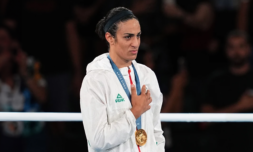Paris 2024 has become a means of resistance for female athletes facing gender apartheid in their homeland.
For the first time in Olympic history, there was full gender parity on the field, as the International Olympic Committee (IOC) reserved equal quota places for women and men.
The Games also featured a more gender-balanced sports program and equitable medal distribution. As expected, both the IOC and fans celebrated this achievement with the hashtag #GenderEqualOlympics, but what about #GenderApartheid?
Gender apartheid refers to institutionalized oppression based on gender, including systematic violence and domination. Recently, Amnesty International urged all states, particularly UN member countries, to recognize it as a crime under international law.
Discussions on gender apartheid and the Olympics date back to the 2012 London Games.
Human Rights Watch, a New York-based advocacy group, argued that Saudi Arabia should not compete without female athletes and launched the ‘No Woman No Play‘ campaign. As a result, the Gulf Kingdom sent two female athletes to the Olympics for the first time in 2012.
After global calls from the ‘End Gender Apartheid’ movement and Amnesty International concerning the plight of women and girls under the Islamic Republic of Iran and Taliban regimes, this year featured several notable events for female athletes enduring systemic oppression or fleeing their countries.
A moment of history.
“FREE AFGHAN WOMEN”
Manizha Talash of Afghanistan in the first ever Olympic Breaking competition. She loses her qualifier but not before unveiling a cape from underneath her jumper.
Representing the refugee team, Talash is Afghanistan’s first female… pic.twitter.com/gXaeo4Ka7n
— Sanny Rudravajhala (@Sanny_Rudra) August 9, 2024
‘Don’t forget the girls in Afghanistan.’
Since 2021, the Taliban-controlled Afghanistan has systematically stripped women of their rights. Currently, women and girls are banned from participating in sports due to the absence of gender-specific gym facilities and the lack of allocated budget for such activities.
The IOC selected six athletes – three women and three men – to represent Afghanistan at Paris 2024. Atal Mashwani, spokesperson for the Taliban’s sports directorate, dismissed the female athletes in a press statement, saying, ‘Only three athletes are representing Afghanistan.’
Many view the IOC’s decision to include female athletes from Afghanistan as a symbol of hope demonstrating that oppressors will not prevail. However, others see it as a way to legitimize the Taliban’s unrecognized regime.
Among the critics is Friba Rezai, one of the first female athletes to represent Afghanistan in the Olympics. In an op-ed for The New York Times, she argued that female athletes fleeing Afghanistan should compete as refugees since those remaining in the country lack the opportunity to participate.
Indeed, Afghan female athletes also competed under the Refugee team. Manizha Talash made history by unveiling a ‘Free Afghan Women’ cape, despite being disqualified for her political statement.
Her message resonated widely as she urged, ‘Don’t forget the girls in Afghanistan. My participation shows their courage and that dreams can be achieved even in captivity.’




















